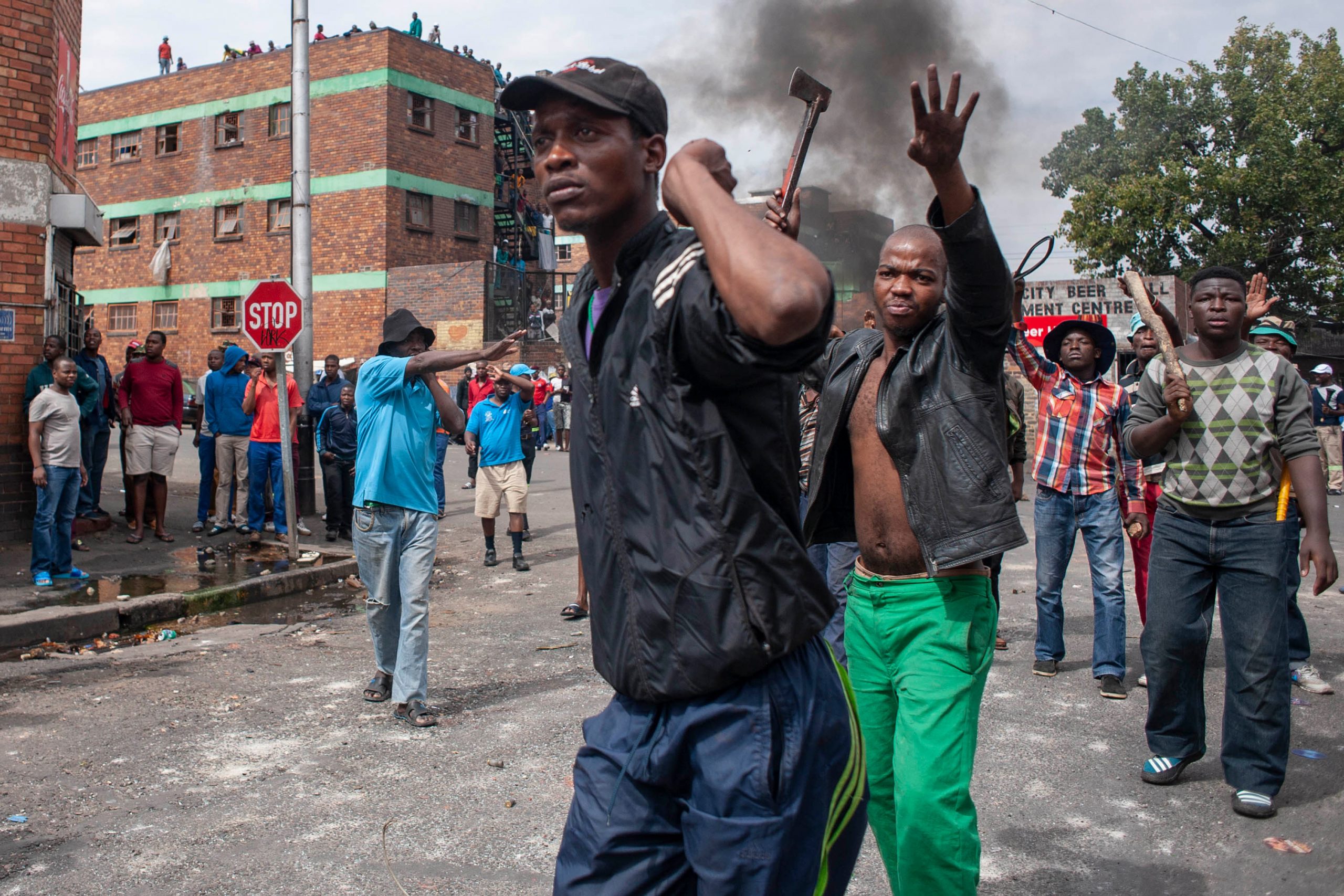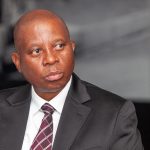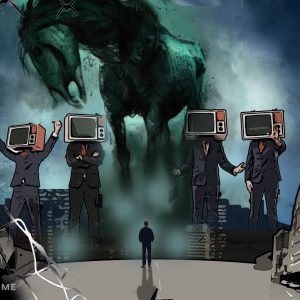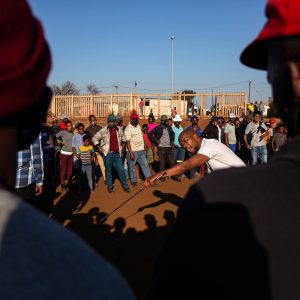Rising xenophobia needs to be challenged
Amid widespread economic decline and the alarming lowering of standards of political discourse in South Africa, opportunistic xenophobes are stoking the fire against migrants.
Author:
26 August 2020

As South Africa collectively exhales in relief because it seems that the worst of the Covid-19 pandemic may be over, the country must still confront the economic devastation resulting from the lockdown restrictions. More than three million jobs have been lost during the lockdown, close to 300 000 people arrested, at least 12 people killed by the police and the army, and large numbers of people subjected to violent evictions.
These have been deeply traumatic times for many people. And with a shrinking economy and massive public anger at the ANC’s unwillingness, or inability, to act against the brazen corruption in the party, many people are fearful about their own future and the future of the country.
In this difficult situation, there has been an alarming escalation of an increasingly crude nativist and xenophobic discourse. Much of it is driven by elites who are trying to exclude migrants from positions at universities and in corporations. And it is not just happening in WhatsApp groups or online.
Related article:
The escalation and normalisation of xenophobic sentiment reached a new stage when the Sunday Independent published a vituperative article on its front page on 23 August under the headline, in capital letters, “SA UNDER FOREIGN CONTROL”, with the word “foreign” in red. As one Facebook user commented: “Imagine a headline in a German newspaper in 1938 with the headline, in the same colour scheme, reading ‘Germany under Jewish control’. Or a newspaper in Rwanda in 1993 with the headline, again in the same colour scheme, reading ‘Rwanda under Tutsi control’.”
In the article, migrants are referred to as “enemy agents’”. The Sunday Independent is not generally considered a credible newspaper after its explicit support for the Jacob Zuma faction of the ANC, its withdrawal from the Press Council and the shenanigans of its owner, Iqbal Survé, who was massively enriched with public money during the Zuma years. Nonetheless, it is a deeply shocking headline and one that can be read as a deliberate incitement to violence.
The ‘put South Africa first’ rhetoric
The article suggests that the devastating levels of unemployment in South Africa are due to migration. This is plainly not the case, and it’s an argument that leaves racial capitalism and ANC mismanagement off the hook while scapegoating people who are already in an extremely precarious situation. However, it is a view that has been shared by many xenophobes recently, including the All Truck Drivers Foundation, which used and encouraged vicious language against migrant drivers. More than 200 people – mostly migrants – have been killed in the violence plaguing the trucking industry. Many of those who are spewing the most dangerous xenophobic and chauvinistic statements online claim, much like President Donald Trump in the United States, to be acting out of love for South Africa and its people. Some xenophobes here have even adopted a version of Trump’s slogan: ‘Put South Africa First’.
The road to this increasingly steep descent of our public discourse into such dangerous forms of dehumanisation was paved by a number of public figures, including several ANC politicians as well as former mayor of Johannesburg Herman Mashaba, South African First’s Mario Khumalo, and the African Transformation Movement’s Vuyolwethu Zungula.
Related article:
Recently, Andile Mngxitama – he of the pro-Zuma and pro-Gupta lobby group Black First Land First – has also made extraordinarily xenophobic utterances, stating that “Isis [Islamic State] terrorists control large parts of SA informal trade. They use spaza shops to generate income to fund their war.”
While these public figures, politicians and aspirant politicians make extremely dangerous and dehumanising xenophobic statements in their own names, there is also an organised project to drive xenophobia online through Twitter accounts with fake identities. As recent research, widely reported, has shown, its online movement is spearheaded by a Twitter account called @uLerato_pillay.
The uLerato Pillay account has spread hashtags such as #PutSouthAfricansFirst, #ForeignersVacateOurJobs, #OpenRefugeeCamps and #InfluxOfImmigrantsMustStop. Following the dramatic turn to the far right in Europe and the US in recent years, the account has defended its crude xenophobic messages as an expression of patriotism.
It’s not yet clear if the turn to xenophobia by forces formerly aligned to Zuma and the Guptas is part of a deliberate political strategy. But there is no doubt that Mashaba, Khumalo and Zungula aim – like Trump, British Prime Minister Boris Johnson and other right-wing figures internationally – to build a political base through the deliberate cultivation of xenophobia.

Anti-migrant march
Mashaba’s new organisation, The People’s Dialogue, is scheduled to be launched as a new political party on Saturday 29 August. A march with extreme xenophobic demands is planned for the same day and has been endorsed by Khumalo and the uLerato Pillay account. The march has a set of demands such as for migrants to leave the country, camps to be established to detain migrants, and to ban them from taking part in many sectors of society. These demands are a frightening echo of those associated with the early years of German fascism in the 1930s. Mashaba has distanced himself from the organisers and the march.
But Mashaba, who has also used language typical of fascism, including his association of migrants with criminality, dirt and disease, is not backing down from his xenophobic platform. Speaking to New Frame ahead of the launch, he said: “Well, if they think I am xenophobic, then they must call our Constitution xenophobic because I think our Constitution is very clear – we must be in South Africa and under what conditions. So obviously, if what I am articulating is being called xenophobic, tell them then our constitution is xenophobic.”
Related article:
In his time in the office of mayor of the City of Johannesburg, Mashaba actively presented himself to the public in deeply xenophobic terms. He staged a citizen’s arrest of an informal trader and deflected criticism on Twitter by citing his concern for public health and not allowing “people like you to bring us Ebolas in the name of small business”.
Talk about immigration also features prominently in his campaigning for The People’s Dialogue. Asked about the research that guides his statements on “the influx of undocumented persons” and the “crisis of illegal immigration” – statements Mashaba has repeatedly made – he was dismissive and said he didn’t need to provide the research.
“No, you do the research because you are the people who are saying we are xenophobic as South Africans… I am saying, do research, I don’t have to do research. I am telling you we have a problem of illegal immigration in South Africa, seriously,” he said.
Raids carried out in the inner city during Mashaba’s mayoral term that targeted migrants and undocumented people were recently described as “cruel, humiliating, degrading and invasive” as well as “constitutionally invalid” by the high court in Johannesburg.

Despite this scorching rebuke from the court, Mashaba continues to make inflammatory, and frequently bizarre and plainly untrue, comments about migrants. “We are the only country in the world accused of xenophobia… Only in South Africa so-called human rights lawyers and commentators are saying South Africa is a free-for-all. What type of country can operate without borders?” Mashaba said. “When you’ve got 10 undocumented people in the country, isn’t that too much?”
Mashaba is not an outlier among new aspirants on the terrain of electoral politics. Recently, when the Daily Maverick ran an article on the uLerato Pillay account and how it manipulates Twitter’s algorithms to spread its xenophobia, the South African First party tweeted a message of support and solidarity to the uLerato Pillay account.
“We stand with all those that contribute to the #PutSouthAfricansFirst, no amount of propaganda machinery will discourage us. We are for the people of South Africa by South Africans. @uLerato_pillay is us and we are @uLerato_pillay. It’s South Africans First or nothing!” the message read.
‘We are superior, we are a great nation’
Meanwhile, in an online vlog, Khumalo thanked all those who were organising the march on 29 August and planning to take part in it. “What we are saying right now is that we understand what is happening in the country.
“Our people are angry and they have the right to be angry and we do not expect them to be kind or to be happy because there is nothing to be happy about. High unemployment rate, crime, drugs, influx of illegal foreigners that are undocumented for no reason, porous borders, and many many other things that don’t make sense to us.
“So what we are saying is to all South Africans, let’s put us first. No other country matters to us but our country, no other nation matters to us more than our nation. We are superior, we are a great nation and we will remain as such,” Khumalo said in the video.

This active project to dehumanise migrants from both the Right and the pseudo-Left, which cohered around Zuma and the Guptas as well as the Zuma regime that became notorious for looting and political repression, is a direct and explicit contribution to and escalation of existing sentiment that has already led to repeated violence and loss of life. If there is further violence and loss of life, as is all too likely, Mashaba, Khumalo, Mngxitama and the uLerato_Pillay account will all be complicit.
It is almost exactly a year ago that messages started spreading online calling for a shutdown and the removal of migrants from communities. That online discourse had horrific material consequences. The terror of xenophobic violence in the streets started on 1 September last year, and two weeks later at least 12 people had lost their lives.
Related article:
We need to be mindful that xenophobia is not solely directed at African migrants. Asian migrants have been defamed, attacked and murdered too. Xenophobia has also intersected with Islamophobia. In October 2015, more than 500 people were displaced after days of xenophobic violence explictly directed at Muslims in Makhanda in the Eastern Cape.
Many of the displaced traders were married to South African women, fluent in South African languages and had children in local schools. The violence in the town was driven by local businessmen, including a taxi drivers’ association. It was implicitly supported by local ANC and DA politicians and directly opposed, at times with physical confrontation, by the local Unemployed People’s Movement.
Not a preordained outcome
There is no question that there is increasing desperation over mass unemployment, a devastating wave of retrenchments, sharp decline in public housing provision, regular and usually violent evictions, crime and worsening conditions in public healthcare and schools, as well as the misrule and brazen looting under the ANC. Historically, around the world, conditions like these have often led to authoritarian populism and even outright fascism.
However, we must be mindful of the fact that xenophobia is not an inevitable outcome of social crises – and it is far from being something that uniformly or exclusively festers among impoverished and working-class people. Local political and business elites have often driven xenophobia, and there is also xenophic sentiment in universities and corporations. The largest organisations of impoverished and working-class people, such as Abahlali baseMjondolo and a number of progressive trade unions, have taken clear positions against xenophobia.

Loren B Landau, from the African Centre for Migration and Society at the University of the Witwatersrand, said: “What’s emerging is the natural extension of patterns of scapegoating and political mobilisation that have gone unchecked over the past two decades. Electoral politics has become more contentious as mainstream political parties’ moral corruption is increasingly evident. This makes space for insurgent movements with narrower, populist ideology.
“In a time where so much is uncertain and desperation is so acute, we are all looking for easy answers, for a way out of this intractable mess. Some will find religion. Some will gravitate to other ideologies offering empty promises of salvation through purification. Mashaba and his xenophobic disciples are positioning themselves to be the prophets of purity,” Landau explained.
Related article:
Sharon Ekambaram, head of the refugee and migrant rights programme at Lawyers for Human Rights, questioned Mashaba’s understanding of non-racism when he “ran the city using the apartheid-style divide-and-rule strategy”.
“People like Mashaba and the movement operating under the hashtag #PutSouthAfricaFirst are reactionary racists, anti-poor and have an agenda that speaks to the cut-throat, profit-driven incentives of business, which puts excessive profiteering before people and a decent life for all,” Ekambaram said.
“We have learnt that discrimination based on race or narrow nationalism serves the interest of the tiny rich elite.”
What must be done
Ekambaram said if there is any chance of building a prosperous South Africa for all who live in it, then Mashaba and his ilk need to commit to removing obstacles for all workers and employers in the informal economy. This should happen without demonising a category of people who work in this sector, irrespective of their status in South Africa.
Amir Sheikh, spokesperson for the African Diaspora Forum, described the tweets from the uLerato Pillay account as nothing new. They are, he said, similar to what “reckless, irresponsible South African politicians have been repeating for years without any reprimand or action against them”.
“In recent years, right-wing, populist, anti-immigrant parties continued to receive a double growth and mass support in many countries in Europe and America, and it will not be surprising if similar unknown parties or South African First, African Transformation Movement and organisations like The People’s Dialogue gain such growth and massive supports from electorates,” Sheikh said.
Related article:
“The PutSAFirst campaign is a well-oiled, well-funded campaign, but what is surprising is why the government is silent about it when, in fact, all posts are nothing short of incitement and hate speech,” he added.
“The danger these reckless messages will have on immigrants is loss of lives and businesses due to attacks on them and their interest, and uprooting a well-integrated people from their community due to their nationality, as we recently witnessed in Phola Park in Thokoza.”
These are perilous times. We are all called to conscience, and action.







